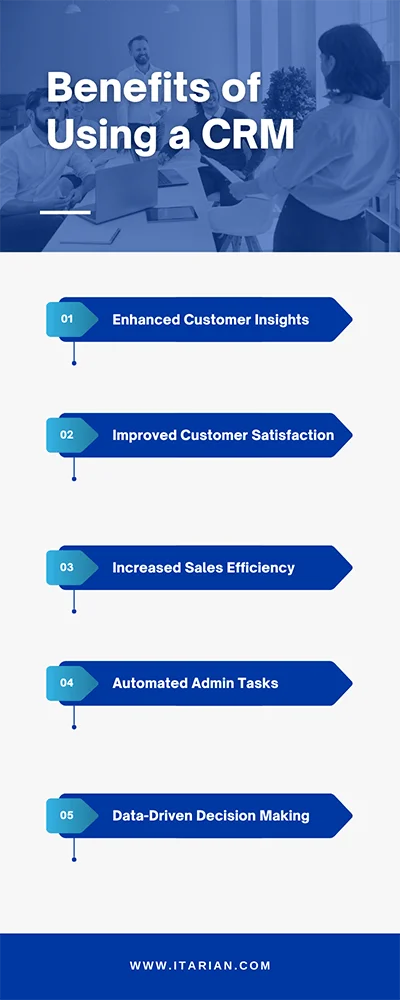What is a CRM?
A Customer Relationship Management (CRM) system is an indispensable technology that orchestrates a company's interactions and relationships with its esteemed customers and promising prospects. It employs sophisticated data analysis to delve into a customer's history, unveiling patterns, preferences, and expectations. CRM is not merely a tool but a strategic asset, focusing intently on enhancing customer retention and propelling sales growth. It is a cornerstone for businesses aiming to thrive in competitive markets.
CRM systems harvest and nurture data from a plethora of communication channels. Every interaction via the company's website, every email correspondence, every conversation through live chat, and every phone call is meticulously captured and cataloged. In this reservoir of data, a wealth of insights waits to be discovered, which are instrumental in personalizing customer experiences and fostering loyalty.
In the dynamic business landscape, understanding the target audience is beneficial and essential. CRM systems are the compass that guides businesses through the intricate maze of customer expectations and preferences. They unveil the nuances of the target audience, offering clarity and direction in tailoring offerings that resonate and create value.
The utility of CRM transcends the boundaries of customer insights; it is a catalyst for operational efficiency. Processes are streamlined, tasks are automated, and redundancies are eradicated. CRM becomes the beacon of productivity in sales, marketing, and service, illuminating opportunities and driving performance.

In the realm of sales, CRM is the silent companion that empowers sales teams. It meticulously stores customer and prospect contact information, creating a repository that is easily accessible and highly organized. Every sales opportunity is identified and tracked, ensuring every potential revenue source stays intact.
The narrative of service is redefined with CRM. Service issues are not just recorded but analyzed. Patterns are identified, solutions are innovated, and customer satisfaction is elevated. Every service interaction becomes an opportunity to enhance loyalty and reinforce the bond between the business and the customer.
Marketing, the art of communication and persuasion, is invigorated by CRM. Campaigns are not just managed but optimized. Data drives decisions, analytics inform strategies, and results are maximized. In a world where the voice of the business strives to rise above the din of competition, CRM ensures that every message is targeted, resonant, and impactful.
A CRM is not just a technological tool but a business partner. It aligns with the aspirations of the business, amplifies its strengths, and mitigates its challenges. In the journey of growth and excellence, CRM is the ally that ensures every customer interaction is an opportunity, every insight is a stepping stone, and every strategy is a masterpiece of precision and relevance. In the world orchestrated by CRM, businesses do not just exist; they thrive, evolve, and lead.
CRM vs ERP
Diving deeper into the nuanced yet distinct roles of CRM and ERP, it's apparent that the two are siblings in the family of business management tools, each possessing unique traits and capabilities. CRM, or Customer Relationship Management, is akin to the outward face of the organization. It's the diplomat, navigating and nurturing relationships with the clientele, both current and prospective. Through the CRM, businesses paint a picture of their customer journey, illuminating paths to enhanced experiences, loyalty, and sustained revenue streams.
On the other hand, ERP or Enterprise Resource Planning is the backbone of an organization's operational structure. The unsung hero is working behind the curtains, ensuring that every cog in the organization's machine runs seamlessly. It focuses on internal processes, unifying them under a single umbrella to ensure efficiency, productivity, and data accuracy. ERP encompasses core business processes, including procurement, project management, operations, and supply chain operations, creating a centralized information and workflow management hub.
When dissecting the roles further, CRM emerges as the strategic asset for customer data management, sales forecasting, and marketing campaign management. It's a repository of insights, offering granular details on customer behaviors, preferences, and expectations. Through analytic tools embedded within CRMs, businesses can glean actionable intelligence to tailor offerings, optimize sales strategies, and enhance customer service protocols.
ERP, in its intricate design, is akin to the nervous system of an organization. It offers real-time data and analytics related to various operational facets. ERP casts a wide net from inventory levels to order processing, from procurement cycles to human resource management, bringing coherence, visibility, and control to the intricate and often siloed operational processes.

The distinction in data focus is another prominent aspect that separates CRM and ERP. While CRM data orbits around customer information and interactions, ERP data is rooted in the organization's operational metrics. These include inventory data, order processing timelines, employee performance metrics, and financial data, offering a comprehensive view of the organizational health and performance.
Yet, despite their distinctive functionalities, CRM and ERP are not isolated. In the contemporary, digitally-driven business ecosystem, integration between these two systems is not just expected but essential. Fusing CRM's customer-centric data with ERP's operational insights creates a comprehensive overview that powers informed decision-making. The synergy ensures customer promises are rooted in operational realities and that organizational capacities align with market demands.
In conclusion, CRM and ERP are pivotal, each in its unique way, to the holistic management and growth of modern businesses. CRM illuminates the path to enhanced customer experiences and market positioning, while ERP ensures that the organizational machinery operates at peak efficiency. In their symbiosis, businesses find the harmony of external excellence and internal efficiency, navigating the competitive business terrains with agility, precision, and resilience. Each system, with its distinct focus and capabilities, contributes to weaving a narrative where businesses are not just operational entities but responsive, adaptive, and evolving organisms that grow in tandem with their clientele and market ecosystems.
Why Choose ITarian as Your CRM?
Selecting ITarian as your CRM partner propels your IT business into a future where each interaction is tailored, insights are profound, and efficiency is the standard. ITarian's CRM is imbued with innovation, integrating the latest technological advancements to ensure your business always stays ahead.
Our CRM offers a user-friendly interface, seamless integration with various tools and platforms, robust analytics, and customizable features tailored to your IT business needs. Our focus is not just on managing customer data but on transforming this data into actionable insights, powering your business strategy, and driving tangible results.
We ensure data security and privacy are paramount, with cutting-edge security protocols safeguarding your sensitive information. With ITarian, experience a CRM that evolves with your business, scaling features and capacities, ensuring that no matter how fast you grow, every customer interaction remains as personalized and impactful as if you were a startup.
Customer Relationship Management FAQ
Answer: A good CRM should offer contact management, sales and lead management, analytics, integrable capabilities, ease of use, mobile access, and worth satisfying customer service.
Answer: Absolutely! CRM isn't exclusive to large corporations. Small businesses can leverage CRM to optimize customer interactions, streamline processes, and enhance productivity, aligning resources effectively to drive growth.
Answer: CRM systems provide a unified platform where customer interactions, issues, preferences, and history are stored. This centralized data helps customer service reps offer personalized, informed, and efficient service.
Answer: The cost of CRM can vary depending on the scale, features, and the service provider. However, with options like ITarian, businesses of all sizes can access cost-effective solutions that offer robust features and scalability.
Answer: Modern CRMs, especially platforms like ITarian, are designed to easily integrate various business tools, including marketing automation, data analytics, communication platforms, and more, ensuring a seamless flow of data and processes.
